A survey by coffee firm Douwe Egberts has found that Britons spend an astonishing £15,600 in coffee shops over a lifetime because they don’t know how to make lattes and cappuccinos at home. It found that 69% of the 2,000 people surveyed spent between £1 and £5 in coffee shops, five days a week.
This is good news for forecourt stores where the standard of coffee on sale just keeps on getting better and better. One brand that’s storming ahead on forecourts is Costa Express. Earlier in the year, Costa announced a deal with Shell to install self-serve coffee bars in more than 550 forecourts and, more recently, the Motor Fuel Group signed an agreement with Costa Express for its 48 sites.
Costa Express machines across the UK already serve around 2.4 million hot drinks every month. The most popular drink is latte, which is the same as that served through Costa high street stores.
Starbucks too has a growing presence on forecourts, including drive-thrus in conjunction with Euro Garages.
A Starbucks spokesperson comments: "We are focused on opening up in new spaces and places where there is increased consumer demand. Customers increasingly want the same quality coffee they know from their experience on the High Street and by growing our roadside and drive-thru presence, we are able to deliver just that great quality coffee our customers know and love on the go, any time, any place." The company plans to open 16 more drive-thrus before the end of the year, including one at the Metro Centre in Gateshead.
Meanwhile, Nescafé remains the nation’s favourite in-home coffee but it’s available out-of-home too, thanks to the Nescafé&Go set-up.
Wendy Christensen, head of standard products at Nestlé Professional, says consumer expectations are higher than ever before but adds that if operators can satisfy these expectations, an increased price point is justified and ultimately they stand to achieve greater margin. "The typical Nescafé&Go beverage retails at £1.10, which has proved a successful and profitable price point for many retailers. At this price, retailers can make an estimated profit of 38p per cup. Based on selling 20 cups a day, six days a week, 48 weeks per year, at an estimated cost of 50p per cup, retailers have the potential to make additional turnover of over £6,300 per year."
It’s all very well offering decent coffee but it’s got to be convenient too. Apparently 290 million coffee opportunities are currently lost due to lack of convenience.
Christenson says: "In a forecourt environment where customers will be time-pressed, it’s essential that operators remove the barriers to convenience be it through the provision of take-away options, accepting card payments or having a separate till for beverage-only purchases.
"Clear point-of-sale is also important as it drives awareness."
Emma Whitehead, a partner at Forge Garage in Milton on Stour, Gillingham, Dorset, has had a Nescafé&Go machine for two years. "It’s as popular as ever," she says, "and continues to have year-round appeal with our customers, with sales averaging around 100 cups a week, at 99p per cup. When people stop for petrol, they’re often looking for fuel for themselves too. Coffee always proves a popular choice for drivers taking a break during their journey or simply wanting something to ’grab and go’.
"We also get our regulars people living close by who pop in for a cuppa as part of their daily commute. The kids love it too, especially the hot chocolate. Customers now treat Nescafé&Go as part and parcel of the service we offer. You’d never think that such a small machine would make us over £5,000 a year!"
But Emma says she realises that it’s not enough to simply have a hot beverages offer available; you have to shout about it. "We make the most of our display with pos material above the counter directing customers to the machine and highlighting any special offers. ’Coffee and a KitKat on special offer’, for example to capture impulse purchases and capitalise on cross-selling opportunities. We’re currently running the Texaco Coffee Club loyalty promotion ’Buy 4 drinks, get a cup free’ and we’ve seen sales increase by around 10% as people join and make more regular purchases, which is great."
Over in Oxfordshire, Tariq Majid, director of Majid and Son at Yarnton Service Station provides his customers with Tchibo coffee through the company’s Profit Share Scheme.
"Changing our coffee supplier to Tchibo Coffee International was one of the best moves we’ve made," he says.
"We were offered a free coffee week to promote the new brand in store and were delighted with the feedback about the great taste.
"Our coffee sales have increased by a staggering 40% and, importantly, the average spend in store is increasing due to the strong pos and varied meal deals Tchibo supports us with."
A Tchibo spokesperson says the company encourages forecourt retailers to combine its coffee with other products. "Offering a coffee with a breakfast bar works well, so we can support them with bespoke campaigns. We also encourage seasonal promotions with back-to-school hot chocolates, winter lattes, energy-boosting espresso shots and meal deals."
For Country Choice and its Boston’s Coffee concept, meal deals are a matter of course nowadays.
"They are a very common promotion," says marketing controller, Stephen Clifford. "Coffee is a great footfall driver and profit generator and around two-thirds of coffee is usually accompanied with food of some kind."
Loyalty cards are offered in a lot of the high street coffee shops and Country Choice can help retailers set up their own scheme. Says Clifford: "Obviously for an independent forecourt, take up will depend on how many regular customers they have. Operationally it’s quite easy we print a quantity of cards with the loyalty mechanic on them and supply the forecourt with a stamp to record the purchase. "
Country Choice’s research has found that just under two-thirds of out-of-home hot beverages are coffee; tea takes around 18% and hot chocolate 16%. Clifford says white, cappuccino and latte each account for around 20% of sales, while espresso accounts for 6%.
As for pricing, Clifford says this depends on the type of outlet.
"In coffee shop chains pricing is around £2-£3, or more, depending on size, variety and whether you’re drinking in or taking out. For forecourts our retailers tend to charge in the region of £1.50 for a proper, freshly brewed coffee, which should deliver 70p to 80p profit after VAT."
Finally, of course quality is important but Clifford says there are other things consumers look out for.
"For some people, buying a coffee is all about minimal fuss and so their needs are fairly functional taking into account things like reasonable quality and speed of delivery.
"For another group of consumers, it’s all about variety these people are looking for choice. Then you have those looking for quality, and for them, it’s got to be freshly brewed (bean-to-cup) coffee made using fresh milk."
Revenue stream
Quality and taste is everything with coffee as consumers become far more discerning and demand the best. Manufacturers such as La Cimbali have responded by developing new technologies that help guarantee consistency in taste and quality.
La Cimbali UK sales and marketing manager, Matthew Tuffee, explains: "Our Q10 super automatic is an ideal self-serve coffee machine, offering full menu capabilities, including chocolate, and can be housed in an area much less than one square metre (the Q10 is only 35mm wide). For complete flexibility there is also the option of coin operation."
Tuffee says that linking with branded coffee chains is all well and good but retailers need to realise that it often means they have to give back up to 70% of the revenue they generate from coffee sales. "A key advantage of our approach over the branded route is the potential revenue stream for the operator. As consumers continue to enjoy the coffee culture lifestyle, the machine and set-up cost should pay for itself within just a few months."
Top Tips
Jo Shinner, marketing manager at Drinkmaster, shares her tips for coffee success:
l Make sure your hot drinks are visible from kerbside to till.
l Keep the machine and serving area spotless especially the floor! Put a pack of wipes or paper towels nearby many people would clean up their own spills if there was an obvious, simple, clean way to do it.
l Place impulse purchase foods near to the hot drinks.
l Promote meal deals/chocolate bar deals etc throughout the store, not just next to the machine.
l Display the hot drink prices away from the machine, so people aren’t "trapped" by having to go to the machine to find out the price.
l Place reminder signs near the queue. Coffee is such a profitable line, yet it’s often stuck away in a corner because that’s where the socket is.
l Why not let the staff drink the coffee from the machine? It’s a visible customer recommendation just make sure the staff genuinely like it!
l Make sure it’s easy for people to carry their drinks. Every customer will have something else in their hands even if it’s only car keys, so ensure the cup is safe to hold without hassle and provide carry trays at the machine not at the till.
l To promote your offer, link the drinks with what’s happening on the day half price coffee all day because it’s the store manager’s birthday, for example.
l Tie in with your locality. For example, if you are near a football ground, use the colours of the local team on a sign promoting a hot drink deal timed for an hour before and an hour after kickoff.





















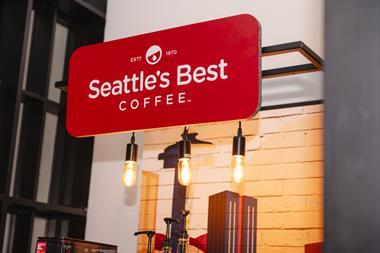
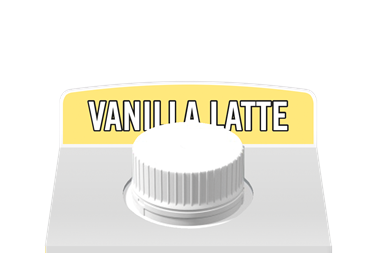
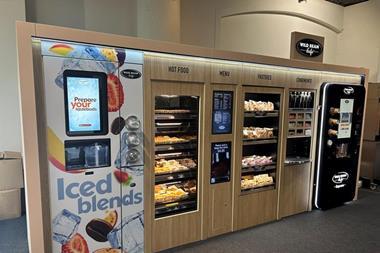
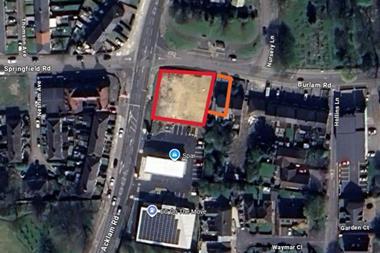
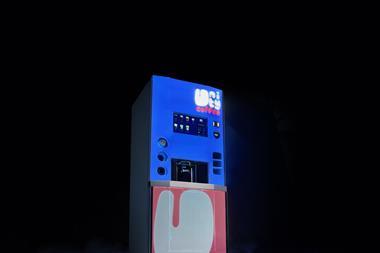
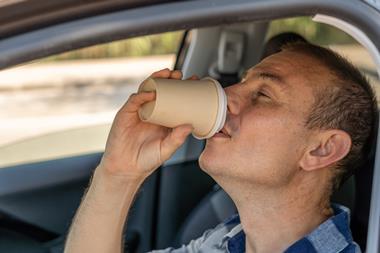
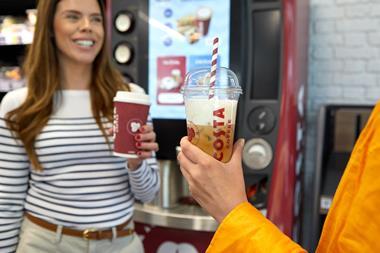
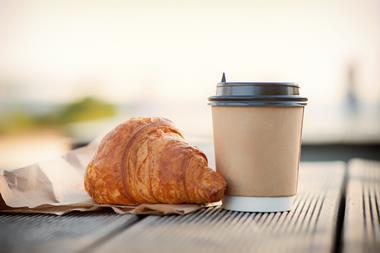
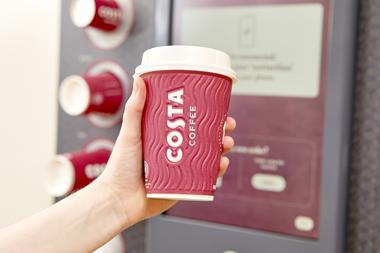
No comments yet